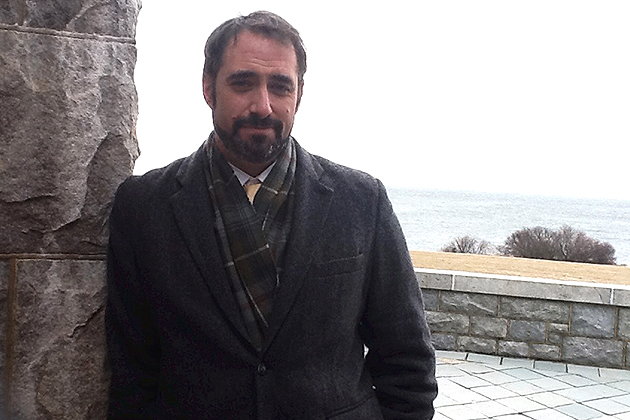
Matthew McKenzie calls Dec. 20, 2012 the unqualified worst day of his professional life.
Ironically, it was made so horrible because two groups of people who rarely if ever agree – fishermen from Maine, Massachusetts, and Connecticut and biologists who study these New England waters – were in total agreement.
“They all agreed: there just aren’t fish out there anymore,” says McKenzie, assistant professor of history and maritime studies at the Avery Point campus.
McKenzie is the Connecticut delegate on the New England Fishery Management Council, which was discussing an assessment of the cod populations off the coasts of Cape Cod, Massachusetts and Georges Bank, Maine. The assessment, carried out by the Northeast Fishery Science Center in 2012, showed not only that cod populations have crashed in the past four years, but that a 2008 assessment drastically overestimated the cod’s numbers.
“Everyone’s first reaction to these numbers was absolute shock,” McKenzie says. “At the meeting there were lots of angry, frustrated, scared fishermen standing in front of the microphone … There was so much fear.”
As a result of the report, the Council voted last month to impose severe cuts to current catch limits for cod along the Northeast coast. McKenzie says these cuts will cripple the 400-year-old industry.
The cuts reduce the amount of allowable cod by up to 77 percent from 2012 levels. In the Gulf of Maine, this is about 1,550 metric tons; 10 years ago, fishermen were allowed to catch up to 8,000 metric tons.
Not only is this a drastic decline in a short period of time, but McKenzie speculates that fishermen today catch only about 1 percent of what their counterparts were catching 100 years ago with much more primitive equipment. And that’s not because of strict regulations, he says, it’s because the fish just aren’t there.
Impact on local communities
This narrative of declining fish stocks that change the course of fishermen’s lives and, in turn, the course of history, is not new. McKenzie remembers from his own youth on Cape Cod the Northeast cod collapse in the 1980’s, which changed the face of the Cape. Vibrant towns that previously enjoyed a year-round fishing economy turned into tourist attractions that are now crowded for three months out of the year, but dormant for the other nine.
“A decline in fishing isn’t the only thing that prevents [these] communities from being vibrant, but it’s a significant one,” McKenzie says.
This historical and cultural perspective is one he’s keen to bring to the Council, which is made up of stakeholders from New England states and includes representatives from the fishing industry and state and federal governments.
“My work has showed me how tightly these working communities are tied to the health of marine resources,” he says. “I saw the ripple effects in the community when cod tanked in the 80’s, and now I’m watching it happen again.”
McKenzie’s research at UConn looks at the dialogue among fishing communities in the Northeast since the 17th century. Although most people see a decline in fish stocks over the past five, 10, or 50 years, he says, he looks at these problems with a 200-year perspective.
McKenzie believes mismanagement of fisheries is a key culprit. When you look in aggregate at how many fish could be available to fishermen now if New England waters hadn’t been fished so intensely in the past, he says, it could amount to tens of billions of dollars’ worth: “That’s just my hunch, but it means that we could have a lot more people working in this industry than we do now, and instead people are really struggling.”
A complex system
McKenzie says New England has one of the most complicated commercial fishing industries in the world due to its diversity: there are 27 different managed species, of which cod is only one.
“You can’t cleanly manage one species at a time,” he says.
Fishermen will inevitably catch types of fish they’re not trying to, so restrictions on any one species of fish affect the others, and there are a limited number of permits available for catching various types of fish. Many young fishermen don’t expect they will ever be able to afford one of these permits, and as a result, McKenzie says, the structure of the industry is similar to sharecropping: young fishermen can hope only to work on a boat owned by someone else, never running an enterprise of their own.
The latest series of cuts will only worsen these problems. But McKenzie says that, with fishermen and scientists in agreement over the depletion of stocks, it’s unavoidable.
“For the past 30 years, whenever these crises have come, there’s always been a little wiggle room granted to fish more than the science really tells us should be allowed,” he says. “This time there is no wiggle room. We can’t dodge this bullet.”


